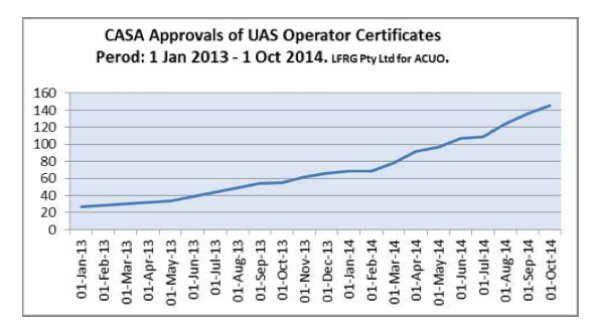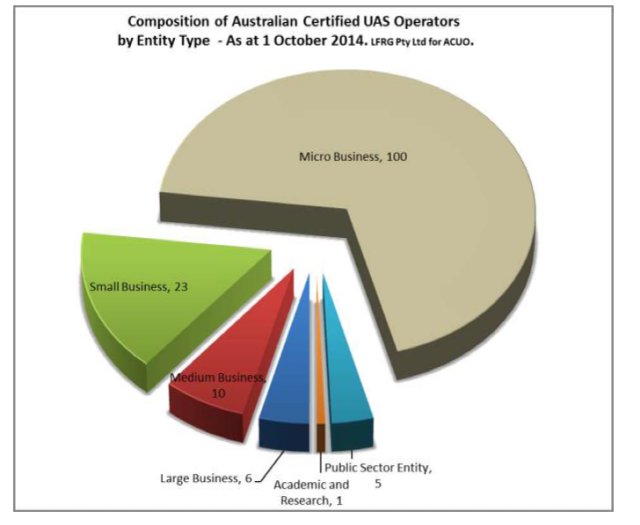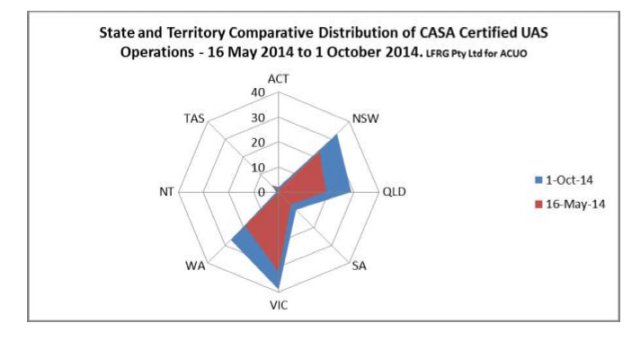 A major milestone is about to be recorded by the Australian unmanned aircraft industry with the Australian Civil Aviation Safety Authority (CASA) to certify its 150th certified unmanned aircraft system (UAS) operator this month.
A major milestone is about to be recorded by the Australian unmanned aircraft industry with the Australian Civil Aviation Safety Authority (CASA) to certify its 150th certified unmanned aircraft system (UAS) operator this month.
This milestone represents a 50% increase in the number of CASA certified UAS operators since May this year. If the current pace is sustained, the number of certified operators is now likely to pass 200 by as soon as March 2015.
This surge in certification “represents the true coming of age of the commercial unmanned aircraft systems (UAS) sector in this country” says Joe Urli, President of the Australian Certified UAV Operators Association. “It is now reasonable to talk of a national operator base in the order of 400-500 separate commercial entities within short years, with this reaching into virtually all segments of Australia’s dominant industry sectors. The impacts will be felt from the Australian Stock Exchange (ASX) through to small communities in regional Australia, and small and micro businesses are at its forefront.
“The industry is growing at an exceptional rate, and is doing so on a trajectory completely separate to the traditional patterns seen in the Australian national aerospace and defence industry bases. The sheer numbers of new UAS operator certificates are matched by a corresponding boom in start-up companies established specifically to pursue new markets leveraging low-cost, off the shelf products.
“These firms have far more in common with IT sector start-ups than multinational defence manufacturing contractors” says Urli. “Australian governments are failing to understand this reality and need to acutely realign their understanding of where the commercial UAS sector fits into the national industrial base if our true market potential is to be achieved.”
At 1 October 2014, CASA had issued a total of 146 UAS operator certificates. Analysis of CASA records commissioned by ACUO shows 100 certificates alone are held by micro businesses and another 23 by small businesses. Ten certificates are held by medium businesses, predominantly in the engineering and surveying sector, while six certificates are held by large enterprises.
 Four ASX listed firms with operating entities now hold unmanned aircraft operator certificates, these being Cardno (Cardno Hard and Forester); AusNet Services (Select Solutions); Xtek and Worley Parsons.
Four ASX listed firms with operating entities now hold unmanned aircraft operator certificates, these being Cardno (Cardno Hard and Forester); AusNet Services (Select Solutions); Xtek and Worley Parsons.
“The emergence of ASX-listed firms as certified operators is an important indicator of the rate of maturation of the unmanned systems sector in Australia” says Urli. “This should be seen as a direct reflection of a more sophisticated view of technology as an investment option from within the finance sector, as well as a reflection of the inherent opportunities in an important emerging global industry.
“Australia is exceptionally well placed to exploit new opportunities associated with the linking of established industries such as civil engineering and infrastructure development with UAS technology. Australia is already a world leader in using UAS as an integral element of open pit mining operations using contracted services-type business models.”
Five Australian public agencies currently hold certificates, these including the Australian Federal Police, which has been experimenting with UAS for several years, as well as the state police of South Australia and Queensland.
The national operator base now includes its first tertiary and research sector entity, with the University of New South Wales securing its CASA certification in August. “This is an important turning point given the number of universities with active UAS-focussed research programs in this country. CASA regulatory requirements for UAS have been in place for a decade and the lag now significantly contrasts with the race by universities and research agencies in the United States to secure interim and restricted approvals from the US Federal Aviation Administration for their own flight operations” says Urli.
“We see Australian universities achieving comprehensive compliance with CASA regulations for safe UAS operation as a national competitive advantage if progressed in the near term” says Urli.
“Both the United States and Europe are some three to four years away from a comprehensive UAS certification regime but once it comes into being, the baseline for all university UAS programs will change globally. Serious UAS research programs will be expected to hold certification as part of standard practice.
“Australian universities right now have the privileged position of being able to pursue first mover status with clear global market advantages. The research and tertiary education sectors of few countries ever get such opportunities laid before them.”
The national surge in operator certificates since May has seen Victoria remain the dominant state in overall numbers with 39 holders; however New South Wales, Queensland and Western Australia are seeing the fastest rate of growth as a whole.
The impact of the emerging sector on regional Australia is likewise proving to be a sustained feature of the growth pattern, with an approximate 66:33 divide between operators located in capital cities and those in regional areas.
“This pattern first became clear in May of this year and it has remained a constant in the surge of the past five months” says Urli.
“Our analysis indicates this pattern is likely to be sustained given the already established links between the UAS operator community and the mining sector, but also as a reflection of growing interest in the technology by primary producers.”
 CASA issued its first UAS operator certificate back in November 2002 to the Brisbane-based company Helimetrex. More than a decade later, in January 2013, there were still only 27 certificates holders in total, this again highlighting the dramatic scale of industry expansion over just the past two years.
CASA issued its first UAS operator certificate back in November 2002 to the Brisbane-based company Helimetrex. More than a decade later, in January 2013, there were still only 27 certificates holders in total, this again highlighting the dramatic scale of industry expansion over just the past two years.
“With such widespread interest in the UAS industry, the future looks very prosperous indeed for those with the foresight to legitimize their business model early” says Urli.
The full current list of CASA certificate holders can be viewed here.
ACUO was established as a legal entity in March 2010 and currently represents approximately one third of all entities holding Australian Civil Aviation Safety Authority unmanned aircraft operator certificates.
The association is chartered to promote the growth and the expansion of the commercial unmanned aircraft industry in Australia and to ensure the safe and orderly growth of the sector.
ACUO represents Australia globally as part of the International Remotely Piloted Aircraft Systems Coordination Council, the pre-eminent global policy coordination body for this important sunrise industry.
Notes on data:
The analysis of Australian unmanned aircraft systems certificate holders used as the basis for this release has been conducted for ACUO by LFRG Pty Ltd, which is internationally recognised for its expertise and knowledge of the underpinning business models and practices of the global unmanned aircraft systems sector.
Classification of companies in this analysis has followed standard Australian Bureau of Statistics definitions, with the exception of grouping non-employing businesses (i.e. sole proprietorships and partnerships without employees) with the micro business category – that is businesses employing less than 5 people, including non-employing businesses. Small business is defined as businesses employing 5 or more people, but less than 20 people. Medium is defined as a business employing 20 or more people but less than 200 people, while large business is defined as entities employing more than 200 people.
Source: Press Release
